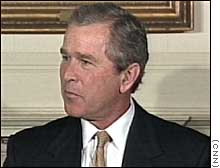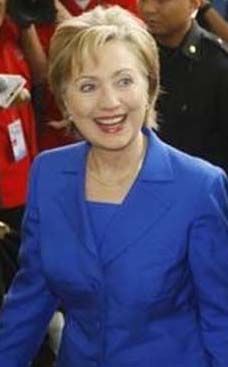
There's no question that anti-Americanism increased dramatically worldwide in the past half-decade, in part because of our muscular response to 9/11. It's also true that, since the Cold War's end, Washington has significantly curtailed its "public diplomacy" efforts to win hearts and minds overseas. It's fair to pin much of this rising anti-Americanism on the arrogantly dismissive, go-it-alone tenor of the Bush administration's foreign policy from day one. I guarantee you, the world's currently high threshold for cooperation with America will be cut in half the minute a new occupant walks into the White House come January 2009. It'll be 50 percent off the top simply because the rest of the world will be happy to have a more reasonable America back on the scene. We witness a similar phenomenon today with France since Nicolas Sarkozy replaced the rightly vilified Jacques Chirac.
Thomas P. M. Barnett writes: Washington has significantly curtailed its "public diplomacy" efforts to win hearts and minds overseas
Realistically repairing America's image abroad
SHNS | editorials and opinion
Scripps Howard News Service
Column
By THOMAS P.M. BARNETT
Scripps Howard News Service
There's no question that anti-Americanism increased dramatically worldwide in the past half-decade, in part because of our muscular response to 9/11. It's also true that, since the Cold War's end, Washington has significantly curtailed its "public diplomacy" efforts to win hearts and minds overseas.
As political leaders and terrorism experts increasingly call for "strategic communications" in the long war against radical extremism, our intelligence community grows quite interested in this rising tide of anti-Americanism, calling it a threat unto itself. In the past year, I've had conversations with various agencies on this subject, and here's what I submitted for their consideration:
First, while it's true that America has engaged in less-public diplomacy since the Cold War, linking that to rising anti-Americanism is specious. During the Cold War, efforts like Radio Free Europe were essential to providing populations trapped behind the Iron Curtain access to independent news sources. With today's globe-spanning 24-hour news cable networks and the Internet, nearly anyone can access any desired viewpoint.
While it's true that radical extremists and their sympathizers flood global nets with slanted broadcasts and sheer propaganda, there's no shortage of mass-media venues through which any audience can access American perspectives. Indeed, the global reach of our mass media fuels an anti-Americanism all its own.
Stacking a concerted U.S. strategic communications effort on top of that existing cacophony, already perceived by many as dominated by American voices, is unlikely to have a positive effect. Anyway, if Americans don't trust their own government's propaganda, why should anyone else?
Second, nothing America says during this long war trumps our deeds. In that regard, it's fair to pin much of this rising anti-Americanism on the arrogantly dismissive, go-it-alone tenor of the Bush administration's foreign policy from day one. I guarantee you, the world's currently high threshold for cooperation with America will be cut in half the minute a new occupant walks into the White House come January 2009.
It'll be 50 percent off the top simply because the rest of the world will be happy to have a more reasonable America back on the scene. We witness a similar phenomenon today with France since Nicolas Sarkozy replaced the rightly vilified Jacques Chirac.
Third, it's obvious that a lot of this anti-Americanism stems from our current military operations in Iraq, which are simply unsustainable in political terms. The American public accepts sacrifice so long as progress is apparent and most of the world seems on our side. The Bush administration has failed on both counts: botching the postwar and isolating America from both traditional and potential allies.
That means American troops must be pulled back soon from frontline activity in a big way. No, we won't leave Iraq anytime soon. This will be a Vietnam in reverse, moving from large-scale direct action to advisory roles and focused special operations.
Why? Because we've engineered a Balkans-done-backwards by removing the dictator up front and then overseeing the agonizing plunge into sectarian strife. Iraq's inevitable "soft partition" is what pushes the Bush White House to repeatedly float the Korean War analogy: because our baby-sitting job is nowhere near over, American troops must assume a minimal combat profile.
Beyond Bush, two historical trends remain crucial:
A significant portion of anti-Americanism is driven by globalization's rapid advance around the planet. To many individuals challenged daily by this tumultuous process, globalization equals Americanization.
Absent our efforts to make globalization less dislocating in the short term and more equitable in the long run, there's virtually no chance we'll get the world to like us better by explaining ourselves better. Frankly, we'd accomplish far more by curtailing our disastrous agricultural subsidies.
Moreover, as China's stunning rise makes it a prime conveyor belt of globalization's benefits and ills, today's anti-Americanism segues into tomorrow's anti-Chinese sentiment. Beijing is already responding, mounting what Joshua Kurlantzick has dubbed -- in his excellent new book of the same name -- a "charm offensive" designed to mollify critics of its mercantilist trade with underdeveloped regions, and to exert "soft power" in support of its foreign-policy goals.
Add it up and there's little reason why America should launch some massive strategic communications campaign to improve its tattered image abroad. Instead, we must simply stop pretending that 9/11 was all about us when it remains really all about "them" and this frightening juggernaut called globalization.
(Thomas P.M. Barnett is a visiting scholar at the University of Tennessee's Howard Baker Center and the senior managing director of Enterra Solutions LLC. Contact him at tom(at)thomaspmbarnett.com.)












